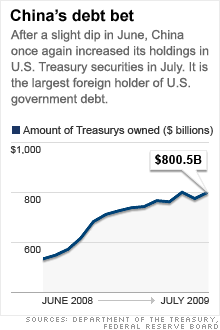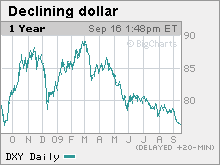China still likes us ... for now
The Treasury keeps churning out debt and China is still buying. But with the dollar faltering and a trade spat brewing, will China continue to buy U.S. bonds?


 |
| The dollar continues to slide against other currencies, prompting some to wonder if that will lead China to sell some of its U.S. Treasury holdings. (Click the chart for more currencies.) |
NEW YORK (CNNMoney.com) -- It looks as if China still can't get enough of one of America's finest exports: our debt.
Despite some public chastising in the past few months by Chinese officials about how much the U.S. government is spending to get out of the recession, the latest figures from the Treasury Department show that China has continued to buy up U.S. bonds this summer.
As of the end of July, China owned $800.5 billion in U.S. Treasurys. That's up $24.1 billion, or 3%, from the prior month and follows a slight dip in China's holdings from May to June.
China surpassed Japan as the largest holder of Treasury securities in September 2008, and over the past year, it has increased its stake in U.S. debt by 45%.
This is both good news and bad. On the one hand, it's encouraging that there are buyers for all the debt that the Treasury is pumping onto the market. Overall, foreigners purchased $15.3 billion more in long-term securities than they sold in July, down substantially from net purchases of $90.2 billion in June.
But at the same time, some worry that the U.S. is becoming too beholden to China.
What happens if China suddenly decides that its appetite for Treasurys is sated, or worse, decides to start dumping a significant portion of its holdings? A big sale of Treasurys could cause longer-term interest rates to shoot up since bond prices and yields move in opposite directions.
And a lot has changed in the past month and a half that could make U.S. debt less appealing to China.
Since the beginning of August, the dollar has fallen nearly 3% against the euro, yen and a basket of four other major currencies. The weakening greenback could lead to more inflation concerns, which would dilute the value of China's Treasury holdings.
There's also been this week's tire tariff tizzy. Some have speculated that a trade war with China could result in China selling some of its U.S. Treasury stake as retaliation for any further tariffs on goods imported from China.
Despite these fears, several bond experts said they don't think China will stop buying Treasury bonds anytime soon for two simple reasons: the U.S. government debt market is both the most liquid and safest around.
"I'm not so worried about China selling Treasurys. Where else could they go with all the cash they have? They'll continue to buy Treasurys," said Matthew Smith, president and chief investment officer with Smith Affiliated Capital, a fixed-income money management firm in New York with $2.3 billion in assets
The fact that China is the largest foreign owner of U.S. Treasurys does put them in a powerful position. With over $800 billion in Treasury holdings, China obviously has a lot of leverage to try and sway U.S. monetary, fiscal and trade policy. That partly explains their concerns about our deficit and the recent uproar over the tire tariffs.
"A little bit of the tough talk from China is jawboning. They want to keep the playing field for trade level. They are saying to the U.S. that if you want us to keep buying your bonds, let's keep this friendly," said John Donaldson, vice president and director of fixed income with Haverford Trust, a money management firm based in Radnor, Pa. with about $6 billion in assets.
But if China were to unwind, or hint that it might start to unwind its Treasury holdings, that would hurt China as much as it hurts the U.S. That's because if the bond market seriously thought China was going to sell bonds, prices would probably plummet.
"If China signaled they wanted to sell, they would poison the well. They couldn't leave the market without anybody noticing and that would hurt the value of other holdings," said Brian Battle vice president at Performance Trust Capital Partners, a fixed-income trading firm in Chicago.
Even though China is probably not going to unload Treasurys en masse anytime soon, there are legitimate concerns about what might happen if China slowly started diversifying out of U.S. bonds.
Smith said that China, as well as other emerging markets, may use derivatives contracts to try and hedge their bets on Treasurys and move into other assets instead.
"The fear with China is they may be swapping Treasurys for commodities. So even though they still own a lot of Treasurys, you could wake up one morning and find that they don't have as much," he said.
Battle added that China realizes there would be dire financial consequences if it sold Treasurys now. But he thinks China is taking a patient and shrewd approach to investing so it won't have to keep relying on Treasurys as a safe haven. So it may only be a matter of when, not if, China starts reducing its U.S. debt holdings.
"I think China will gradually rotate into other assets. They won't be leaving the Treasury market anytime soon because they have no other choice," he said. "But over the long-term, China is going to do what's best for China. They just can't move that much money out of Treasurys quickly."
Still, Donaldson thinks these fears are overblown. He maintains that, even for the long term, what's best for China is to keep buying U.S.-backed debt.
"People get scared about China selling or reducing U.S. debt holdings. But China is going to operate in its own best interest," Donaldson said."Trashing their existing holdings reduces the value of what they own. It's highly unlikely they would do that."
Talkback: Can the U.S. keep finding buyers for new Treasury or will demand from China and other nations soon run out? Share your comments below. ![]()

